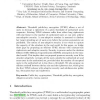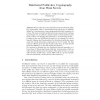132 search results - page 7 / 27 » On Public Key Encryption from Noisy Codewords |
121
Voted
ICICS
2010
Springer
14 years 10 months ago
2010
Springer
Threshold public-key encryption (TPKE) allows a set of users to decrypt a ciphertext if a given threshold of authorized users cooperate. Existing TPKE schemes suffer from either lo...
115
Voted
IACR
2011
14 years 9 days ago
2011
What does it mean for an encryption scheme to be leakage-resilient? Prior formulations require that the scheme remains semantically secure even in the presence of leakage, but onl...
137
Voted
CRYPTO
2011
Springer
14 years 15 days ago
2011
Springer
In CRYPTO 1997, Canetti et al.put forward the intruiging notion of deniable encryption, which (informally) allows a sender and/or receiver, having already performed some encrypted...
123
Voted
PKC
2009
Springer
16 years 1 months ago
2009
Springer
Abstract.We introduce the notion of distributed password-based publickey cryptography, where a virtual high-entropy private key is implicitly dened as a concatenation of low-entrop...
96
Voted
PAIRING
2007
Springer
15 years 6 months ago
2007
Springer
A proxy re-encryption system allows the proxy to transform ciphertexts encrypted under Alice’s public key into the different ciphertexts that can be decrypted by Bob’s secret ...


